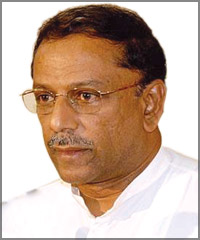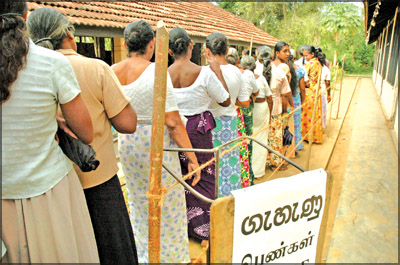Electoral Reforms: Political parties reach unanimity
Ravi Ladduwahetty
In a resounding victory and a landmark in the annals of independent
Sri Lanka’s chequered political landscape, for the first time, all major
political parties represented in Parliament and the 32- member
Parliamentary Select Committee has reached unanimity for the need for
change in the electoral system which has been hitherto the bane of the
political economic and social fabric of this thrice blessed nation.
|

Minister Dinesh Gunawardena |
Here, in a wide ranging interview, Chairman of the Parliamentary
Select Committee on Electoral Reforms, Mahajana Eksath Peramuna Leader,
Chief Government Whip and Minister of Urban Development and Sacred Area
Development Dinesh Gunawardena with the Daily News he spells out the
sweeping reforms which are aimed at political stability and clean polls.
Q: When did the reforms process begin
and what are the main highlights ?
A: The proposed electoral
reforms began during the tenure of the United National Front Government
of 2001-2003 where I was appointed as the Chairman of the Parliamentary
Select Committee on Electoral Reforms.
|

Voters line up at a polling booth. |
The first Committee which had 21 members later was increased to 29
and now stands at 32 under the present Parliament. This committee has
represented to Parliament the core issues of the Interim Report that the
last Committee submitted to Parliament in 2002.
The reforms entailed the Amendments to the Elections Act which will
also enable Parliament to have 140 Members elected on the First Past the
Post System and a another 70 MPs from the District Proportional
Representation system.
The total is now 210 and the remaining 15 will be from the National
PR which will enable minority parties and those who would not have been
elected to Parliament to be elected and have an opportunity to serve
their masses. Unanimity has been reached in principle but the bone of
contention is the percentages and the numbers.
Q: Will there be a re-demarcation of
electoral boundaries ?
A: It has been proposed
that the electoral boundaries be re-demarcated through a Delimitation
Commission as the number of registered voters has been increased in
certain areas; while there have been reductions in the other areas.
There are for instance, 130,000 voters in the Kaduwela electorate, a
substantial increase while there has been a remarkable reduction in the
Colombo West and Colombo East.
There are also proposals to have multi-member Constituencies, for
instance like the system of yore where UNP’s slain Presidential
Candidate Gamini Dissanayake was the first MP for Nuwara Eliya/
Maskeliya, former Speaker and Minister Anura Bandaranaike as the second
MP and founder Ceylon Workers Congress Leader Saumyamoorthi Thondaman as
the third MP for the same electorate. The Attorney General has also
recommended that the Commission should be perpetual and that that the
appropriate amendments be done to Article 95 and 99 to the Constitution.
Q: Will you bring in Electronic
Voting ?
A: There is also an
amendment to the Presidential/ Parliamentary/ Provincial Councils Acts
to enable electronic voting which will drastically slash the costs of
holding elections. This will mean that the voters will vote
electronically akin to the system now in place in India and Bangladesh.
The system will be tamper proof which will also mean that in the
event of some individual tampering it, the system will get locked.
It will also require an official to unlock the system for resetting
and recommencement of the voting.
This will also drastically reduce the number of election returning
officers who are mandated for election duty. This will enable the
release of the results by one hour after a Local government poll and
three hours for the Parliamentary polls and will be a slighter delay by
the time the Elections Commissioner announces the District PR after the
appropriate mathematical calculations.
A machine will cost around Rs. 15,000- Rs. 20,000 and there will be a
demand for around 10,000 such machines. The Elections Commissioner’s
staff will take around a year to be trained and this system will be well
in place by the time of the next Parliamentary poll billed for 2010 and
the Presidential polls for 2011.
Q: There was much talk recently
regarding the recognition / de-recognition of political parties. Can you
explain this proposal ?
A: This will mean that the
recognition of political parties which are now represented in Parliament
and which are not will remain the same till the next polls. There is a
new Bill which will be effective soon which will mean that there will be
political parties both at national level and provincial levels.
The minimum criteria for a political party to stay in power at
national level will be to have a minimum of one MP in the House and for
Provincial Parties to have a minimum of 5% of the votes polled within
the Province.
Otherwise they will be eliminated. The reason for this being that
there are 54 registered political parties of which only 23 are active.
Q: There is an allegation that the
number of women in politics is very low. How do you plan to rectify this
?
A: There is a mandatory
provision in the reforms for the inclusion of women which will be at all
levels, be they Local Government bodies, Provincial or Parliamentary
|
Highlights of
Electoral Reforms |
- A hybrid system of
the First Past
the Post (FPP) system and the District PR
- Electronic Voting from the
next Parliamentary/ Presidential polls
- Return of the Ward system
for Local Government bodies
- New Bill for
recognition/ de-recognition of Political Parties
- Re mapping of electoral
boundaries
- Multi-Member
Constituencies
- Return of by- elections
|
polls.
The proposals also ensure the return of the ward system of yore which
is the collection of two or three Grama Sevaka divisions which will also
bring the communities and the public together in the development of the
grassroots where there will be participatory mechanisms for both
budgeting and development.
The final touches to the amendments to the draft Bill are being
placed now and the legalities also are under scrutiny.
Q: Will we see by-elections again ?
A: It has also been
proposed that by elections be held like in the past in the event of a
resignation and / or death of a member. Nevertheless, the by election
should not affect District PR of the District. Any vacancy should be
filled by the election of a MP from the respective political party who
has polled the next highest percentage.
However, the replacement of a National List MP can be filled by the
recommendation of the Party’s General Secretary.
Q: How will the FPP system benefit
prospective candidates ?
A: The return of the FPP
will also facilitate Members to restrict themselves to the their
electorates which will drastically slash their areas of jurisdiction
where the canvassing is also easier and far less expensive than
operating on the entire span of the district which will make them
susceptible to corruption.
This will also be no need for budding MPs to be financed by
businessmen and underworld communities who will be waiting in earnest
for their rates of return when their Members are elected to power. They
will truly be independent.
It is also heartening and redeeming that all the political parties in
the House have agreed on principle on this proposal barring the TNA
which has said that they will not agree on anything until the main issue
- the national question is over.
There is also an opinion to reconsider the abolition of the Executive
Presidency. However, obvious as they are, both these issues are beyond
the mandate of the Parliamentary Select Committee on Electoral Reforms. |

